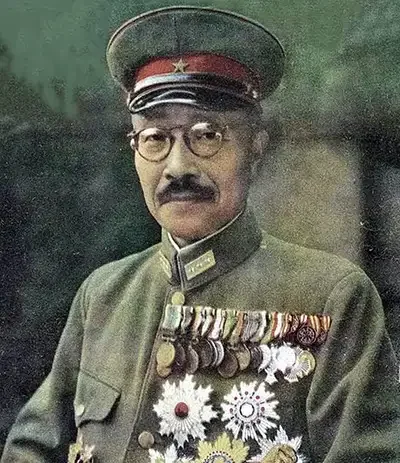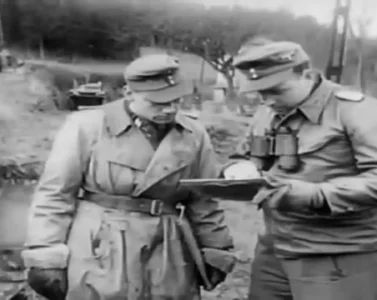- Military History
- Biographies
- Militarians Biographies
- General Hideki Tojo (Tōjō)
General Hideki Tojo (Tōjō)
Japan's prime minister and military commander during World War II
During the period of World War II, the only man the people of the Allied nations hated as much as Adolf Hitler was probably Hideki Tojo. Yet, unlike Hitler, a genuine (if evil) political leader, Tojo was little more than the bureaucratic head of the military regime that dominated the Japanese empire. Not a popular leader to his countrymen, he gained a reputation among his fellow bureaucrats as "The Razor" a hyper efficient bureaucrat who knew how to get things done.
Tojo was horn into a traditionally military family on December 30, 1884, in lwate prefecture. His father, Eikyo Tojo, was a general and Hideki Tojo was expected to attend the military academy, to graduate (as he did in 1905) and to pursue a career in the army.
Tojo distinguished himself in much of his military positions, but no one called his career glorious. He engaged in combat only once, in August 1937, when he directed operations against the Chinese in Chahar (near Zhangjiakou).
Prior to this one campaign, he held regimental staff assignments from 1905 to 1909. In 1915, he graduated from the Army Staff College and served in Berlin as an assistant military attaché from 1919 to 1921. During the years in Germany, he attained the rank of major becoming a resident Japanese officer from 1921 to 1922.
Tojo's diplomatic service brought him into the inner circles of government and he contributed to the military's efforts to take control of national policy and administration. Promoted to lieutenant colonel in 1924, Tojo became chief of the Army Ministry's important Mobilization Plans Bureau, where he had a hand in directing Japan's preparations for war.
After a promotion to colonel in 1929, Tojo received a regimental command, then assumed the position of chief of the Army General Staff's Organization and Mobilization Section. He served in this capacity from 1931 to 1933, when he was promoted to major general and made deputy commandant of the Military Academy.
Tojo joined a group of officers known as the Control Faction, which was devoted to updating and modernizing the Japanese army, with an emphasis on military technology. However, his association with the group was viewed unfavorably by an opposing faction, and Tojo was punished with a series of posts far below his status and ability.
His career took a turn for the better when he was given command of an infantry brigade in 1934-35, then of the Kwantung Army Gendarmerie, a post in which military leaders of the highest rank were traditionally groomed. He held this position until 1937, gaining promotion to lieutenant general in 1936. From 1937 to 1938, he was chief of staff of the Kwantung Army.
While in Manchukuo, Tojo became known for his efficient and decisive manner and his aggressiveness as a staff officer. A tough disciplinarian, he was secretly called "The Razor" by his men. Following his years in China, Tojo became vice minister of the army and chief of Army Air Headquarters on the eve of World War II (1938-41). From this position, Tojo emerged as a leading spokesperson for the most aggressive pro-Axis faction of the army, even as pro-Axis supporters gained dominance in government affairs. Promoted to general in 1941, he was named as prime minister. Even members of the government who objected to military domination approved Tojo's selection as a way of staving off an outright military coup.
Tojo strongly advocated Japanese expansion into East Asia through the military force and the establishment of a regional "co-prosperity sphere" under Japanese control. When relations between Japan and the United States worsened in 1941 because of Japanese aggression, Tojo held firm, opposing any compromise that would undermine Japan's position in East Asia. By the fall of 1941, Japan would have no choice but to enter the world war. Tojo, widely viewed by many as a man who could guide Japan to victory, was named prime minister in October. In December 1941, his cabinet declared war on the United States by attacking the American naval base at Pearl Harbor.
Tojo established a hard line in international and military affairs, propelling his nation into war and steadily expanding the scope of that war. During 1941 to 1944, he was often given wide ranging dictatorial powers in foreign as well as domestic affairs. For most of the war, Prime Minister Top) also served as chief of the Army General Staff. In this position, he directed military operations with ruthless but indifferent skill. For example, he never really developed a long-term strategy.
After Saipan fell to Allied forces on the 12th of July 1944, a coalition of Japanese state leaders exerted their influence to force Tojo's removal as a military head. Shaken by his country's rapidly deteriorating military situation, Tojo bowed to the coalition without a struggle.
In September 1945, Tojo tried to commit suicide when he learned he was to be arrested and tried for war crimes. Upon his recovery, he was tried as ordered by the International Military Tribunal in Tokyo and found guilty. Tojo was executed by hanging in December 1948.
General Hideki Tojo (Tōjō) - Quick Facts
- Russian Civil War (1917-1922)
- Japanese Invasion of Manchuria (1931-32)
- Second Sino-Japanese War (1937-1945)
- WWII (1939-1945)
- {{#owner}}
- {{#url}} {{#avatarSrc}}
{{name}} {{/url}} {{^url}} {{#avatar}} {{& avatar}} {{/avatar}} {{name}} {{/url}} - {{/owner}} {{#created}}
- {{created}} {{/created}}
























